PREVIOUS
Freedom Fighters from Tamil Nadu Part – 07
Freedom Fighters from Tamil Nadu Part – 07
(இதன் தமிழ் வடிவத்திற்கு இங்கே சொடுக்கவும்)
32. Venni Kaladi
Early Life and Background
- Venni Kaladi, also known as "Periya Kaladi," was an 18th-century general and valiant warrior.
- He served under Poolithevan, the administrative and military governor of Nerkattumseval, located in the Sankarankoil taluk of modern-day Tenkasi, Tamil Nadu.
- During this period, the region was under threat from British colonial forces seeking to expand their control over indigenous Tamil lands.
Role in Resistance Against British Occupation
- Khan Sahib was a title given to Mohammad Yousuf Khan, who played a significant role in the British efforts to dominate the region.
- Yousuf Khan had previously faced defeat in the battle of Vasudevanallur but resumed his efforts to extend British occupation.
Heroic Battle and Martyrdom
- In a fierce battle characterized by close-quarter combat, Venni Kaladi demonstrated extraordinary bravery.
- During the fight, his abdomen was severely cut open.
- Determined to continue the battle, he tore cloth from his headwear and wrapped it around his abdomen to stem the bleeding.
- Despite his grave injury, Venni Kaladi continued to fight valiantly.
Victory and Ultimate Sacrifice
- After securing victory in the battle, Venni Kaladi delivered the news of their success to his king, Poolithevan.
- However, his injuries were too severe, and he died on the lap of his king, having fought to his last breath for the freedom of his land.
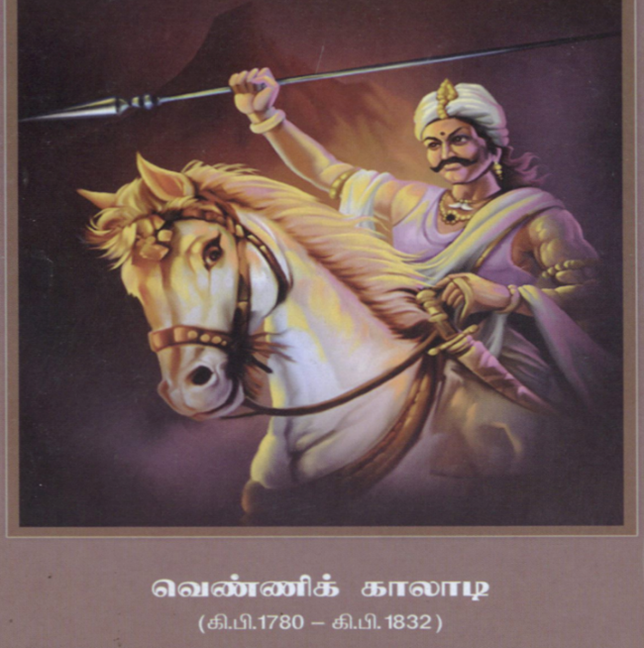
33. J. Shivashanmugam Pillai
Early Life and Education
- Jagannathan Shivashanmugam was born on 24 February 1901 in Madras.
- He completed his schooling in Madras and pursued higher education at Loyola College, Chennai.
- He later earned his master's degree from Madras University.
Political Career
- Shivashanmugam Pillai was a prominent figure in the Indian National Congress and made significant contributions to Indian politics:
- Mayor of Madras:
- In 1938, he became the first Scheduled Caste mayor of Madras.
- Speaker of the Madras Legislative Assembly:
- After India's independence, Shivashanmugam was elected to the Madras Legislative Assembly in 1951.
- He was nominated as the first Speaker of the Assembly, serving from 1951 to 1955.
- Union Public Service Commission:
- From 1955 to 1961, Shivashanmugam served on the Union Public Service Commission, which is responsible for overseeing the recruitment and appointment of civil servants.
- Rajya Sabha:
- In 1962, he was nominated to the Rajya Sabha, the upper house of the Indian Parliament, where he served until 1968.
Publications
- Shivashanmugam Pillai was also a writer and published several works:
- History of the Adi Dravidas.
- The Life, Select Writings and Speeches of Rao Bahadur M. C. Rajah (1930), co-authored with M. C. Rajah.
- Legislative Protection of Cultivating Tenant Labourers.
Death
- J. Shivashanmugam Pillai passed away on 17 February 1975 at the age of 73.
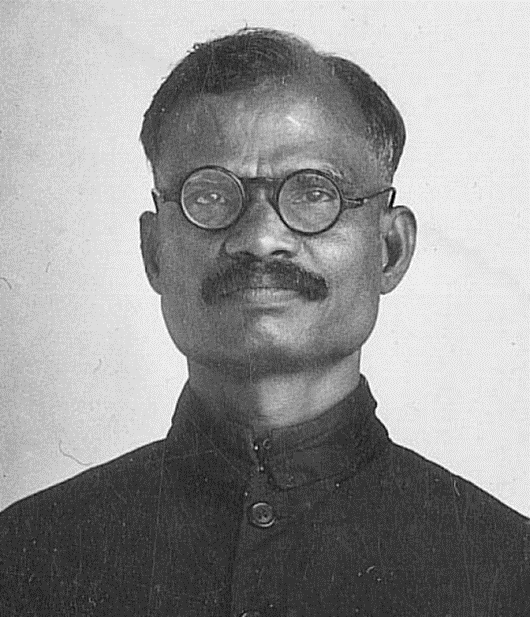
34. P. Subbarayan
Early Life and Education
- Date of Birth: September 11, 1889.
- Place of Birth: Near Tiruchengode, Namakkal district.
- Family Background: Belonged to a zamindari family.
Education:
- He got graduated from Madras Presidency College.
- He obtained a Master of Arts from Christ Church College, Oxford.
- He earned a Doctor of Laws (LLD) from the University of Dublin.
Legal Career
- Law Practice: Started practicing law at the Madras High Court in 1918.
Political Career
- Affiliation: Indian National Congress.
- Joining the Congress: He became a follower of Mahatma Gandhi and joined the Indian National Congress in 1933.
Ministerial Role:
- He was appointed Minister of Law and Education in 1937 by Rajaji, who was the Chief Minister of the Madras Presidency.
Participation in the Quit India Movement:
- Actively participated in the Quit India Movement.
- He was arrested along with Congress leaders Satyamurthy and M. Bhaktavatsalam.
Post-Independence Contributions
- Constituent Assembly: He was member of the Constituent Assembly of India in 1947.
- Diplomatic Role: He served as India's first Ambassador to Indonesia from 1949 to 1951.
- Rajya Sabha Membership: He was member of the Rajya Sabha from 1954 to 1957.
- Lok Sabha Membership: He was elected to the Lok Sabha from Tiruchengode in 1957, served until 1962.
Governorship and Later Life
- Governor of Maharashtra: He appointed as the Governor of Maharashtra in 1962.
- Death: Passed away on October 6, 1962, at the age of 73.
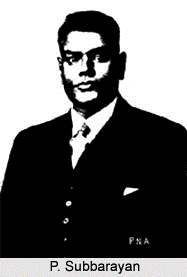
35. Chidambaram Subramaniam
Early Life and Education
- Date of Birth: January 30, 1910.
- Place of Birth: Senguttaipalayam, near Pollachi, Coimbatore district, Tamil Nadu (formerly Presidency of Fort St. George).
- Education:
- He completed early education in Pollachi.
- He earned a B.Sc. in Physics from Presidency College, Chennai (affiliated with the University of Madras).
- He graduated with a law degree from Madras Law College, Chennai.
Political Career
- Early Involvement and Freedom Struggle
- Civil Disobedience Movement: He was an active member during college days.
- Quit India Movement: He was imprisoned in 1942 for participation.
- Constituent Assembly: He elected as a member and contributed to framing the Constitution of India.
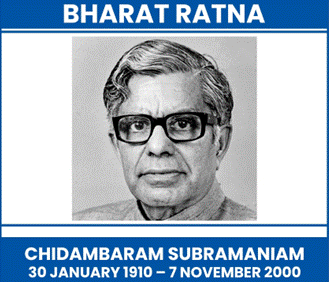
Roles in Madras State (1952-1962):
- He served as Minister of Education, Law, and Finance under Chief Ministers Rajaji and K. Kamaraj.
- He was the first Leader of the House in the Madras Legislative Assembly during his tenure.
National Leadership:
- He served as Minister of Steel and Mines in 1962 after being elected to the Lok Sabha.
- As Minister for Food and Agriculture, he played a crucial role in the Green Revolution, transforming India into a self-sufficient nation in food grains.
Green Revolution:
- He was an architect of modern agricultural policy, working with M. S. Swaminathan and B. Sivaraman to introduce high-yielding seed varieties and intensive fertilizer use.
- He established the National Agro Foundation in Chennai and the Bharathidasan Institute of Management in Tiruchirappalli.
Later Political Roles:
- He served as Minister of Consumer Affairs, Food and Public Distribution from 1971 to 1974 under Prime Minister Indira Gandhi.
- He was the Deputy Chairman of the Planning Commission from 1971 to 1972, where he was influential in shaping economic policies.
- He was the Minister of Finance from 1975 to 1977, advising on the devaluation of the Indian Rupee during the Emergency.
- He was appointed Minister of Defence from 1979 to 1980 under Prime Minister Charan Singh.
- He served as Governor of Maharashtra from 1990 to 1993 but resigned after criticizing Prime Minister P. V. Narasimha Rao’s administration.
Awards and Recognitions
- Bharat Ratna: Awarded in 1998 for his role in ushering in the Green Revolution.
Other Awards:
- Y. B. Chavan National Integration Award
- U Thant Peace Award (1996)
- Norman Borlaug Award (1996)
- Anuvrat Award (1988)
Publications and Legacy
- Books:
- The New Strategy in Indian Agriculture.
- Some Countries Which I Visited Round the World.
- The India of My Dreams.
- Commemorations:
- A commemorative coin and postage stamp were issued in his honor in 2010.
- The Shri Chidambaram Subramaniam Award for Excellence in Character is awarded annually by Bharatiya Vidya Bhavans.
Death
- Date of Death: On his 90th age, November 7, 2000, in Chennai.
- Legacy: The last surviving cabinet minister who served under Jawaharlal Nehru, Lal Bahadur Shastri, and Gulzarilal Nanda.
36. Veeran Sundaralingam
Early Life
- Date of Birth: April 16, 1771.
- Place of Birth: Governagiri Village, near Panchalankurichi, Tuticorin district, Tamil Nadu.
- Parents: Kaladi and Mutharuli.
Role in the Polygar Wars
- Position: General of the Poligar Veerapandiya Kattabomman.
Fight Against the British:
- Played a significant role in the resistance against the British East India Company.
- Fought in the First Polygar War (1799) and is believed to have died during this conflict.
- Some accounts suggest he may have been killed during the Second Polygar War (1800-1801) while assisting Kattabomman’s younger brother, Oomaithurai.
Legacy
- Memorial: In 2009, the Tamil Nadu government announced plans to build a memorial for Sundaralingam at Governagiri.
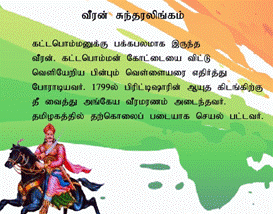
37. S.N. Sundarambal
Birth and Early Life
- Born: October 7, 1913, in Veerapandi, Tiruppur.
- Family: Daughter of Natchimuthu Goundar.
- Background: She born in affluent family, with a strong inclination towards social service.
Early Involvement in the Freedom Struggle
- First Act of Patriotism (1928): She offered gold bangles to Mahatma Gandhi at a public meeting to support the Congress party’s anti-colonial efforts.
Participation in Major Freedom Movements
- Satyagraha Protest (1941): She was arrested along with her newborn son and sentenced to three months in Vellore Prison.
- Quit India Movement (1942): She engaged in non-violent protests; imprisoned for seven months in Vellore Prison.
- Protest Against the British Government (1943): She organized a significant demonstration in Tiruppur, leading to another three-month jail term.
Post-Independence Activism and Social Work
- Farmers' Welfare: She continued activism for farmers' rights and organized protests for their welfare.
- Orphanage Establishment: She founded an orphanage at Angeripalayam in Tiruppur after meeting Vinoba Bhave in the early 1970s.
Legacy and Death
- Death: August 20, 2007, in Tiruppur.
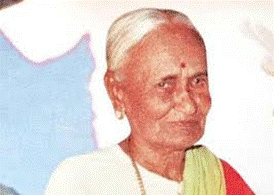
-------------------------------------


